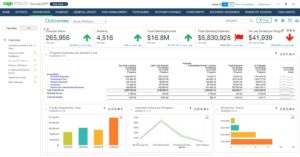Across all types of nonprofit sectors, funders and stakeholders are demanding more transparency into the financial performance and mission impact of NGOs. Whether NGOs are focused on environmental, social, advocacy, community, or human rights work, their finance leaders need to be able to tell their stories in ways that effectively highlight results and accomplishments and promote the mission.
In 2020, NGO finance leaders continue to focus on pressing challenges to the industry, including:
- Increasing revenue and finding additional funders
- Elevating the visibility of their organizations among a growing number of NGOs
- Rooting out and eliminating any waste, fraud, and corruption
- Increasing trust with funders through improved financial transparency and accountability for outcomes
In this article, we’ll explore how NGO finance teams plan to use technology to enhance strategic insight and transform their organizations to better accomplish their missions.
4 Top Technology Goals of NGO Finance Leaders
As a leading cloud accounting and financial management software company, Sage Intacct helps nonprofits and NGOs strengthen stewardship, build influence, grow funding, and achieve mission success.
We recently conducted interviews with financial leaders at NGOs and other international nonprofit organizations, including Atlas Network, Room to Read, White Ribbon Alliance, and World Learning. Here are four goals they told us they are focusing on for 2020 and beyond:
Support global operations by replacing old accounting systems with cloud financial management solutions
NGOs have missions that take their work around the world—often into areas with limited resources. There probably won’t be servers to host business software and it is unlikely that workers will have the support of onsite IT troubleshooting. Teams in the field will often be working from their laptops. They need to be able to access information, as well as report back to headquarters, using cloud-based management systems.
Moving to cloud financial management gives both NGO executives and employees easier access to up-to-date information. Modern, cloud accounting systems support a truly global workforce and mission, enabling everyone to use the same system, at the same time.
Cloud accounting technology reduces IT cost and complexity, because the software is maintained and updated by the vendor and there is no need for finance to maintain a server. If the cloud solution contains API functionality, other business applications can be integrated easily, so the combined data can paint a fuller and more transparent picture of outcomes and mission success.
With a cloud accounting and financial management solution, NGOs eliminate paper and centralize information, so anyone with appropriate security credentials can view real-time information needed for their role. Members of the finance team can work from home or the road as easily as the office. This helps executives stay on top of financial decisions while traveling, and it also enables organizations to offer employees flexibility to work from anywhere.
Achieve global, real-time visibility across multiple entities
NGOs may support multiple entities as new projects kick off and programs expand into new locations. But at the top of the organization, NGO finance leaders can struggle to obtain a consolidated view across multiple locations, different funds, many programs, and even multiple currencies.
Without a financial system that provides a high-level, consolidated view of financial performance, the finance team has to run reports for individual entities and then manually consolidate the data prior to analysis. By the time the reporting is complete, the data is stale. A cloud-based financial system can consolidate data immediately—from every project in every part of the world—no manual intervention required.
NGO finance leaders want to be able to quickly provide accurate and reliable data to key stakeholders, like executives, the Board of Directors, grantors and major donors. To make good decisions, stakeholders need enhanced visibility into revenue streams, programs, and outcomes. Without real-time, consolidated financial information, stakeholders struggle with limited insights to guide strategic decisions for the organization as a whole.

NGOs that measure and analyze outcomes do a better job of communicating the impact of their mission.
Accelerate growth by increasing efficiency and automating manual financial processes
As NGOs grow and add more programs, services, projects and locations, outdated accounting and reporting processes may not be able to scale up. Manual data manipulation within Excel spreadsheets might work for a small organization for a while, but soon, the reporting burden consumes too much of the finance team’s time and attention—crowding out more important priorities.
NGO finance leaders can’t focus on strategic decision-making if they are too busy building pivot tables. Today’s financial management solutions deliver greater automation and efficiency that help NGOs reduce or eliminate manual data entry and data manipulation, so the finance team can focus on strategic priorities that accelerate revenue growth to fund expansion of the mission.
Simplify grant management and facilitate full cost recovery
While direct program costs are easier to fund, unexpected or unplanned overhead costs may require subsidization from an organization’s limited unrestricted funds. It is critical that NGOs have the hard numbers to predict the true cost of projects, so they can fundraise to recover full costs. The only way to know the total financial impact of each project is to have a financial management system capable of tracking how all expenses—including labor, IT and other overhead costs—should be allocated across projects and programs.
Cloud-based accounting software designed for nonprofits can help NGOs simplify grant management. Having instant access to key operational metrics and real-time financial reporting improves financial leaders’ ability to track, manage, and report on grants. Eliminating cumbersome duplicate data entry increases accuracy and saves hours of grant reporting time.
Conclusion
According to the State Department, there are over 1.5 million NGOs in the U.S. alone.[1] Globally there are millions of NGOs—creating plenty of competition for grants and donor funding in 2020. Today’s grantors and donors want to work with NGOs that measure and report on outcomes and results, rather than activities. The right nonprofit financial management system will be an essential tool to help NGO finance leaders support strategic planning and decision making, articulate their organization’s mission story, and become more transparent about outcomes and results with funders.
____________
Joan Benson, Director, Nonprofit Industry Marketing at Sage Intacct, has 25+ years of combined experience in accounting, publishing, and technology. In her role at Sage Intacct, Joan focuses on understanding the needs of nonprofit organizations by creating solutions, support, and best practices that help ensure mission success.
[1] U.S. Department of State, “Non-Governmental Organizations (NGOs) in the United States,” Fact Sheet, accessed January 12, 2020.

